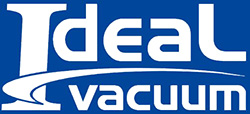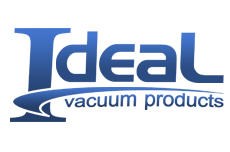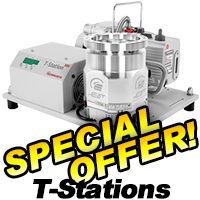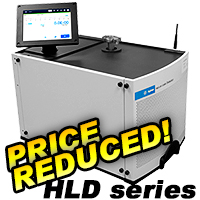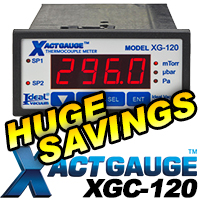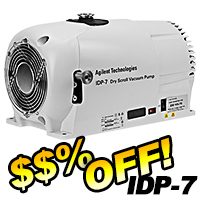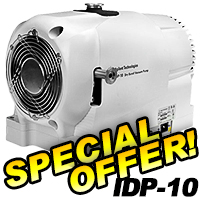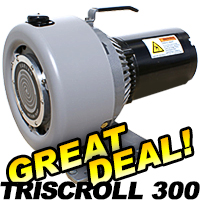Job Purpose:
Helping customers by offering technical and application support is a rewarding occupation. Many of our customers are new to the scientific vacuum equipment industry and they are searching for someone they can trust, who will help them figure out what they need to buy in order to solve their particular problem. When you help them, they are very grateful and will remember you. In fact, they will often ask for you by name the next time they call. That is when you know that you are making a difference and really helping people. Scientific vacuum equipment is used in many areas, including Chemistry, Physics, Engineering, Aerospace, Semiconductor, Nuclear, Medical, Automotive, Textiles, and countless other fields. This position is intellectually challenging and stimulating to talk with our customers and learn what their applications are. You often get to hear about cutting-edge research and experimental setups that are being built to observe new physics. If you are technically oriented and love to learn, this is the position for you. Most of our sales inquiries are over the phone and via e-mail. Good candidates must have excellent oral and written communication skills, along with the willingness to learn and multitask.
The technical sales engineers hired for this position will work closely with our team of sales members, mechanical, & electrical engineers, in a coordinated effort to support our customers. Customer requests can vary from the need for a thermal vacuum test chamber at a rocket launch company to pre-test satellite components; to a physics professor looking to focus his laser through a window into a vacuum chamber. It is challenging and rewarding to foster the skills needed to answer such a broad diversity of technical questions. Our companies are continuously releasing new products and will offer technical training to our sales engineers as those products are released.
Basic Requirements:
- Technical sales experience.
- B.S. in Chemistry, Physics, or Engineering Feilds
- Excellent verbal and written communication skills
- Have a well rounded background knowledge of the vacuum industry
- Enjoy working with customers to help them solve thier problems
Types of Vacuum Equipment We Sell:
- Vacuum Pumps
- Pressure Gauges
- Mass Flow Control
- Vacuum Fittings and Flanges
- Vacuum Chambers
- Complete Vacuum Chamber Systems
- Helium Leak Detectors
- Residual Gas Analyzers
Sample technical skillsets & knowledge that is useful - See answers at the bottom below:
- What skills are needed for technical sales of vacuum pumps for space simulation?
- What skills are needed for technical sales of vacuum equipment for the semiconductor industry?
- What skills are needed for technical sales of vacuum equipment for physics applications?
- What are the different types of vacuum pump technologies?
- What types of pressure measurement gauging is used in vacuum applications?
- What are the main types of fittings and flanges used in vacuum applications?
- What technical skills are needed to sell helium leak detectors for vacuum leak detection applications?
- What technical skills are needed to sell residual gas analyzers for vacuum process gas analysis in semiconductor applications?
- What technical skills are needed to sell thermal vacuum chamber systems for space flight applications?
Daily Tasks Include:
- Answering phone calls and assisting customers on their inquiries regarding our products
- Replying to customer’s inquiries via phone or email in a timely manner
- Preparing detailed product quotations and emailing them to our customers
- Chatting with customers to help them figure out thier technical vacuum challenges
- Developing a technical support bond with our customers
- Assiting customers by helping them select the correct products for thier application
- Spending time chitchatting with key customers to build a long-term supplier customer relationship
How To Apply:
Does this sound like a position for you? Please submit your resume today to workwithus@idealvac.com
Visit our careers web site for other career opportunities. All resume submissions will be treated confidentially and with discretion. Please send your current resume CV and details of current salary package to the email above or fax them to: (505) 872-9001.
What skills are needed for technical sales of vacuum pumps for space simulation?
Technical sales of vacuum pumps for space simulation requires a unique blend of technical knowledge, sales acumen, and interpersonal skills. Here are the key skills and attributes necessary for success in this field:
Technical Skills:
-
Engineering Knowledge:
- Mechanical and Electrical Engineering: Understanding the principles of mechanical and electrical engineering as they pertain to vacuum pumps and space simulation systems.
- Vacuum Technology: In-depth knowledge of vacuum technology, including types of pumps (e.g., turbomolecular, cryogenic, ion pumps), their operation, maintenance, and applications.
-
Space Simulation Expertise:
- Space Environment Simulation: Familiarity with the requirements and challenges of simulating space environments, including ultra-high vacuum (UHV) and extreme temperature conditions.
- Test Protocols and Standards: Knowledge of relevant standards and testing protocols used in space simulation (e.g., NASA standards, ESA standards).
-
Product Knowledge:
- Product Line Proficiency: Detailed understanding of the vacuum pumps and related equipment offered by your company, including their specifications, advantages, and limitations.
- Application Engineering: Ability to apply product knowledge to specific customer needs, offering tailored solutions for different space simulation scenarios.
Sales Skills:
-
Sales Techniques:
- Consultative Selling: Ability to engage in consultative selling, where you understand the customer's needs, provide expert advice, and build long-term relationships.
- Negotiation: Strong negotiation skills to close deals that are beneficial for both the customer and your company.
-
Communication Skills:
- Technical Communication: Ability to explain complex technical concepts in a clear and understandable manner to both technical and non-technical stakeholders.
- Presentation Skills: Proficiency in creating and delivering compelling presentations that highlight the features and benefits of your products.
-
Customer Relationship Management:
- CRM Tools: Familiarity with customer relationship management (CRM) software to track customer interactions, manage leads, and analyze sales data.
- Customer Service: Strong customer service orientation to provide ongoing support and address any issues that arise after the sale.
Interpersonal Skills:
-
Problem-Solving:
- Analytical Thinking: Ability to analyze customer requirements and propose effective solutions using your products.
- Troubleshooting: Skills in troubleshooting and resolving technical issues that customers may encounter with vacuum pumps and systems.
-
Team Collaboration:
- Cross-Functional Collaboration: Ability to work closely with engineering, R&D, and customer support teams to ensure customer satisfaction and continuous product improvement.
- Project Management: Basic project management skills to coordinate complex sales processes involving multiple stakeholders.
-
Networking:
- Industry Networking: Building and maintaining a network of contacts within the space simulation and aerospace industries to stay informed about industry trends and opportunities.
- Professional Associations: Active participation in relevant professional associations and industry events to enhance your knowledge and visibility.
Educational Background:
-
Relevant Degrees:
- Engineering Degree: A degree in mechanical engineering, electrical engineering, or a related field is often preferred.
- Sales or Business Education: Additional coursework or certification in sales, marketing, or business management can be advantageous.
-
Continuous Learning:
- Industry Training: Ongoing training and education to stay current with the latest advancements in vacuum technology and space simulation.
- Professional Development: Participation in seminars, workshops, and other professional development activities to enhance both technical and sales skills.
Possessing a combination of these technical, sales, and interpersonal skills will enable you to effectively sell vacuum pumps for space simulation and build successful relationships with your customers.
What skills are needed for technical sales of vacuum equipment for semiconductor industry?
Technical sales of vacuum equipment for the semiconductor industry requires a mix of technical expertise, sales abilities, and industry-specific knowledge. Here are the essential skills needed for this role:
Technical Skills:
-
Engineering Knowledge:
- Mechanical and Electrical Engineering: Understanding the principles of mechanical and electrical engineering related to vacuum equipment.
- Vacuum Technology: Deep knowledge of vacuum systems, including various types of pumps (e.g., turbomolecular, cryogenic, dry pumps) and their applications in the semiconductor industry.
- Semiconductor Processes: Familiarity with semiconductor manufacturing processes such as deposition, etching, and lithography, and how vacuum equipment is utilized in these processes.
-
Product Knowledge:
- Product Specifications: In-depth understanding of your company’s vacuum equipment, including technical specifications, advantages, and limitations.
- Application Engineering: Ability to apply technical knowledge to specific customer requirements, offering tailored solutions for different semiconductor manufacturing processes.
Sales Skills:
-
Sales Techniques:
- Consultative Selling: Expertise in consultative selling approaches, where you understand the customer’s needs, provide expert advice, and build long-term relationships.
- Negotiation: Strong negotiation skills to achieve beneficial agreements for both the customer and your company.
-
Communication Skills:
- Technical Communication: Ability to explain complex technical concepts clearly and understandably to both technical and non-technical stakeholders.
- Presentation Skills: Proficiency in creating and delivering compelling presentations that highlight the features and benefits of your products.
-
Customer Relationship Management:
- CRM Tools: Familiarity with customer relationship management (CRM) software to track customer interactions, manage leads, and analyze sales data.
- Customer Service: Strong customer service orientation to provide ongoing support and address any issues that arise post-sale.
Industry-Specific Knowledge:
-
Semiconductor Industry Trends:
- Market Awareness: Knowledge of current trends, challenges, and advancements in the semiconductor industry.
- Competitive Landscape: Understanding the competitive landscape and how your products compare to those of competitors.
-
Regulatory and Compliance:
- Standards and Regulations: Familiarity with industry standards and regulations, such as those from SEMI (Semiconductor Equipment and Materials International).
Interpersonal Skills:
-
Problem-Solving:
- Analytical Thinking: Ability to analyze customer requirements and propose effective solutions using your products.
- Troubleshooting: Skills in troubleshooting and resolving technical issues that customers may encounter with vacuum equipment.
-
Team Collaboration:
- Cross-Functional Collaboration: Ability to work closely with engineering, R&D, and customer support teams to ensure customer satisfaction and continuous product improvement.
- Project Management: Basic project management skills to coordinate complex sales processes involving multiple stakeholders.
-
Networking:
- Industry Networking: Building and maintaining a network of contacts within the semiconductor industry to stay informed about trends and opportunities.
- Professional Associations: Active participation in relevant professional associations and industry events to enhance your knowledge and visibility.
Educational Background:
-
Relevant Degrees:
- Engineering Degree: A degree in mechanical engineering, electrical engineering, chemical engineering, or a related field is often preferred.
- Sales or Business Education: Additional coursework or certification in sales, marketing, or business management can be advantageous.
-
Continuous Learning:
- Industry Training: Ongoing training and education to stay current with the latest advancements in vacuum technology and semiconductor manufacturing.
- Professional Development: Participation in seminars, workshops, and other professional development activities to enhance both technical and sales skills.
By combining these technical, sales, and industry-specific skills, you can effectively sell vacuum equipment to the semiconductor industry and build successful, long-term relationships with your customers.
What skills are needed for technical sales of vacuum pumps for space simulation?
What skills are needed for technical sales of vacuum equipment for physics applications?
Technical sales of vacuum equipment for physics applications requires a specialized skill set that combines technical knowledge, sales expertise, and an understanding of the unique needs and challenges in the field of physics. Here are
the key skills needed:
Technical Skills:
-
Engineering Knowledge:
- Mechanical and Electrical Engineering: Understanding the principles of mechanical and electrical engineering relevant to vacuum systems.
- Vacuum Technology: In-depth knowledge of vacuum pumps and systems, including types such as turbomolecular, cryogenic, ion pumps, and their specific applications in physics research.
-
Physics Applications:
- Research Applications: Understanding the typical applications of vacuum equipment in physics, such as particle accelerators, vacuum chambers for experimental setups, and surface science experiments.
- Technical Specifications: Ability to comprehend and communicate the technical specifications and performance characteristics of vacuum equipment as they relate to physics research.
Sales Skills:
-
Sales Techniques:
- Consultative Selling: Expertise in consultative selling, where you engage with researchers to understand their specific needs, provide tailored solutions, and build long-term relationships.
- Negotiation: Strong negotiation skills to close deals that are advantageous for both the customer and your company.
-
Communication Skills:
- Technical Communication: Ability to explain complex technical concepts in a clear and understandable manner to researchers and scientists.
- Presentation Skills: Proficiency in creating and delivering presentations that effectively communicate the benefits and features of your vacuum equipment.
-
Customer Relationship Management:
- CRM Tools: Familiarity with customer relationship management (CRM) software to manage leads, track customer interactions, and analyze sales data.
- Customer Service: A strong customer service orientation to provide ongoing support and address any issues that arise after the sale.
Industry-Specific Knowledge:
-
Physics Research Trends:
- Current Research: Awareness of current trends, challenges, and advancements in physics research that might impact the use of vacuum equipment.
- Emerging Technologies: Knowledge of emerging technologies in vacuum systems and how they can benefit physics research.
-
Regulatory and Compliance:
- Standards and Regulations: Familiarity with relevant standards and regulations governing the use of vacuum equipment in research environments.
Interpersonal Skills:
-
Problem-Solving:
- Analytical Thinking: Ability to analyze the specific needs of physics researchers and propose effective vacuum solutions.
- Troubleshooting: Skills in troubleshooting and resolving technical issues that researchers might encounter with vacuum equipment.
-
Team Collaboration:
- Cross-Functional Collaboration: Ability to work closely with engineering, R&D, and customer support teams to ensure customer satisfaction and continuous product improvement.
- Project Management: Basic project management skills to coordinate complex sales processes involving multiple stakeholders.
-
Networking:
- Industry Networking: Building and maintaining a network of contacts within the physics research community to stay informed about trends and opportunities.
- Professional Associations: Active participation in relevant professional associations and industry events to enhance your knowledge and visibility.
Educational Background:
-
Relevant Degrees:
- Physics or Engineering Degree: A degree in physics, mechanical engineering, electrical engineering, or a related field is often preferred.
- Sales or Business Education: Additional coursework or certification in sales, marketing, or business management can be advantageous.
-
Continuous Learning:
- Industry Training: Ongoing training and education to stay current with the latest advancements in vacuum technology and physics research.
- Professional Development: Participation in seminars, workshops, and other professional development activities to enhance both technical and sales skills.
Summary
Combining these technical, sales, and industry-specific skills will enable you to effectively sell vacuum equipment to the physics research community and build successful, long-term relationships with your customers.
What are the different types of vacuum pump technologies?
Vacuum pumps are essential tools used in various industries to create and maintain a vacuum by removing gas molecules from a sealed volume. Different types of vacuum pump technologies are suited to different applications, based on their operating
principles and the level of vacuum they can achieve. Here are the main types of vacuum pump technologies:
Positive Displacement Pumps
-
Rotary Vane Pumps:
- Operation: Uses a rotating vane inside a chamber to compress and expel air.
- Applications: General-purpose use, including laboratory applications, and small-scale industrial processes.
-
Diaphragm Pumps:
- Operation: Utilizes a diaphragm that moves up and down to create a vacuum.
- Applications: Suitable for applications requiring oil-free operation, such as medical and laboratory settings.
-
Scroll Pumps:
- Operation: Consists of two interleaved spiral scrolls; one remains stationary while the other orbits around it.
- Applications: Used in applications requiring clean, dry vacuums, such as in semiconductor manufacturing.
-
Piston Pumps:
- Operation: Utilizes pistons driven by a crankshaft to compress and move gas.
- Applications: Used in industrial applications where higher vacuum levels are needed.
Momentum Transfer Pumps (Molecular Pumps)
-
Turbomolecular Pumps:
- Operation: Uses rapidly spinning rotors to impart momentum to gas molecules, moving them through the pump stages.
- Applications: High vacuum and ultra-high vacuum applications, such as in electron microscopy and mass spectrometry.
-
Diffusion Pumps:
- Operation: Uses jets of vaporized oil or mercury to transport gas molecules towards the pump outlet.
- Applications: Used in high-vacuum applications like vacuum coating and metallurgy.
Entrapment Pumps
-
Cryogenic Pumps:
- Operation: Uses cold surfaces to condense and trap gas molecules.
- Applications: Ultra-high vacuum applications, including space simulation chambers and particle accelerators.
-
Sorption Pumps:
- Operation: Uses materials (like zeolites) that adsorb gas molecules at cryogenic temperatures.
- Applications: Laboratory applications requiring ultra-high vacuum.
-
Ion Pumps:
- Operation: Uses a strong electric field to ionize gas molecules, which are then trapped on a solid electrode.
- Applications: Used in ultra-high vacuum systems for scientific research.
Hybrid Pumps
- Combination Pumps (Hybrid Pumps):
- Operation: Integrates two or more different vacuum pump technologies within a single unit to optimize performance.
- Applications: Broad range of applications where different vacuum levels and types of gases are handled.
Specialized Pumps
-
Getter Pumps:
- Operation: Uses chemically reactive materials (getters) that react with and trap gas molecules.
- Applications: Often used in vacuum electronics and sealed vacuum systems.
-
Liquid Ring Pumps:
- Operation: Uses a rotating impeller with a liquid ring to compress and move gas.
- Applications: Common in applications requiring rough vacuum and gas handling, such as in chemical processing.
Key Considerations for Selection
- Vacuum Level: The level of vacuum required (rough, medium, high, or ultra-high).
- Application: Specific application needs, including the type of gases to be pumped and the presence of contaminants.
- Maintenance and Operating Costs: Considerations for ease of maintenance and operational costs.
- Cleanliness: Requirements for oil-free or contamination-free environments.
- Capacity and Throughput: The volume of gas that needs to be pumped within a specific timeframe.
Selecting the appropriate vacuum pump technology depends on the specific requirements of the application, including the desired vacuum level, the type of gases involved, and operational considerations.
What types of pressure measurement gauging is used in vacuum applications?
In vacuum applications, accurate pressure measurement is critical for controlling and monitoring the vacuum environment. Different types of pressure gauges are used depending on the range of vacuum being measured. Here are the main types of pressure
measurement gauges used in vacuum applications:
Mechanical Gauges
-
Bourdon Gauge:
- Range: Typically used for pressures above 1 Torr.
- Operation: Measures pressure based on the deformation of a curved tube (Bourdon tube) which straightens out as pressure increases.
- Applications: Suitable for rough vacuum applications where high precision is not required.
-
Diaphragm Gauge:
- Range: Rough vacuum (up to a few Torr).
- Operation: Uses a diaphragm that deflects under pressure. The deflection is measured mechanically or electrically.
- Applications: Often used in low vacuum applications.
Thermal Conductivity Gauges
-
Pirani Gauge:
- Range: 10?4 Torr to 100 Torr.
- Operation: Measures pressure based on the thermal conductivity of the gas. A heated filament’s temperature is affected by the thermal conductivity of the surrounding gas, which changes with pressure.
- Applications: Commonly used in a wide range of vacuum systems for rough to high vacuum measurements.
-
Thermocouple Gauge:
- Range: 10?³ Torr to 100 Torr.
- Operation: Similar to the Pirani gauge but uses a thermocouple to measure the temperature of the heated filament.
- Applications: Used in rough to medium vacuum applications.
Ionization Gauges
-
Cold Cathode Gauge (Penning Gauge):
- Range: 10?7 Torr to 10?² Torr.
- Operation: Uses a high voltage to ionize gas molecules. The resulting ions are collected, and the current generated is proportional to the pressure.
- Applications: Used in high and ultra-high vacuum applications.
-
Hot Cathode Ionization Gauge:
- Range: 10?¹° Torr to 10?³ Torr.
- Operation: Electrons emitted from a hot filament ionize the gas molecules. The ions produced are collected, and the ion current is proportional to the pressure.
- Applications: Used in high and ultra-high vacuum systems, such as in research and semiconductor manufacturing.
Capacitance Manometers
- Range: 10?4 Torr to atmospheric pressure.
- Operation: Measures pressure based on the deflection of a diaphragm, which changes the capacitance between the diaphragm and a fixed electrode.
- Applications: Provides highly accurate and stable measurements, used in processes requiring precise pressure control.
Pirani and Cold Cathode Combination Gauges
- Range: 10?? Torr to atmospheric pressure.
- Operation: Combines the principles of Pirani and cold cathode gauges to cover a broad pressure range.
- Applications: Versatile gauges used in a variety of vacuum systems.
McLeod Gauge
- Range: 10?6 Torr to 10?³ Torr.
- Operation: Measures low pressures by compressing a known volume of gas and measuring the resulting pressure.
- Applications: Used for calibration and standardization due to its high accuracy, though not typically used for continuous monitoring due to its manual operation.
Other Specialized Gauges
-
Spinning Rotor Gauge:
- Range: 10?6 Torr to 10?² Torr.
- Operation: Measures pressure based on the deceleration rate of a magnetically levitated, spinning ball, which is affected by gas molecule collisions.
- Applications: Used in research and calibration laboratories for its high precision and stability.
-
Piezoelectric Gauge:
- Range: Rough vacuum to atmospheric pressure.
- Operation: Uses a piezoelectric crystal that generates a voltage when subjected to pressure changes.
- Applications: Often used in industrial applications for rough vacuum measurements.
Summary
The selection of a pressure measurement gauge for vacuum applications depends on the vacuum range required, the precision needed, and the specific application environment. Understanding the operating principles and appropriate applications of each
type of gauge ensures accurate and reliable pressure measurements in vacuum systems.
What are the main types of fittings and flanges used in vacuum applications?
In vacuum applications, fittings and flanges are critical components that ensure a leak-tight seal between different parts of the vacuum system. Here are the main types of fittings and flanges used in vacuum applications:
Types of Flanges
-
ConFlat (CF) Flanges:
- Description: Made of stainless steel and use a copper gasket for sealing.
- Applications: Commonly used in ultra-high vacuum (UHV) applications due to their ability to achieve very low leak rates.
- Sealing Mechanism: Knife-edge flange bites into the softer copper gasket to form a seal.
-
ISO-K/ISO-F Flanges:
- Description: ISO-K (clamped) and ISO-F (bolted) flanges are part of the ISO (International Organization for Standardization) flange series.
- Applications: Typically used in high vacuum and some ultra-high vacuum applications.
- Sealing Mechanism: O-ring placed in a groove between flanges.
-
KF (Klein Flange) or NW Flanges:
- Description: Also known as NW flanges, these are quick-release fittings.
- Applications: Used in low to high vacuum applications, such as laboratory and light industrial vacuum systems.
- Sealing Mechanism: O-ring compressed by a clamp ring.
-
ANSI (American National Standards Institute) Flanges:
- Description: Flanges that conform to ANSI standards.
- Applications: Often used in process vacuum systems.
- Sealing Mechanism: Typically use gaskets and bolted connections.
-
ISO-LF (Large Flange) Flanges:
- Description: Larger versions of ISO-K/ISO-F flanges.
- Applications: Used in systems requiring large diameter connections, suitable for high and ultra-high vacuum.
- Sealing Mechanism: Similar to ISO-K/ISO-F with O-ring sealing.
Types of Fittings
-
Compression Fittings:
- Description: Use a ferrule to compress the tube and form a seal.
- Applications: Used for connecting metal or plastic tubing in vacuum systems.
- Sealing Mechanism: Compression of the ferrule against the tube.
-
VCR (Vacuum Coupling Radiation) Fittings:
- Description: Metal gasket face seal fittings.
- Applications: Common in high purity and ultra-high vacuum systems.
- Sealing Mechanism: Metal gasket compressed between two mating surfaces.
-
Swagelok® Fittings:
- Description: Popular brand of compression fittings known for their reliability.
- Applications: Used widely in laboratory and industrial vacuum systems.
- Sealing Mechanism: Double ferrule system provides a tight seal.
-
VCO (Vacuum Coupling Orbit) Fittings:
- Description: O-ring face seal fittings.
- Applications: Used in high vacuum applications where frequent disassembly is required.
- Sealing Mechanism: O-ring compressed between two mating surfaces.
-
Welded Fittings:
- Description: Directly welded to tubing or components.
- Applications: Used in systems requiring permanent, leak-tight connections.
- Sealing Mechanism: Weld joint.
Key Considerations for Selection
- Vacuum Level: Choose the fitting or flange type that can maintain the required vacuum level (e.g., high vacuum, ultra-high vacuum).
- Material Compatibility: Ensure the material of the fitting or flange is compatible with the process gases and the overall system requirements.
- Ease of Assembly and Disassembly: Consider how often the system will need to be assembled and disassembled.
- Leak Tightness: Select fittings and flanges that offer the required level of leak tightness for the application.
- Size and Configuration: Ensure the fittings and flanges are available in the necessary sizes and configurations for the specific system design.
These components are crucial for building and maintaining efficient, reliable, and leak-free vacuum systems across various applications.
What technical skills are needed to sell helium leak detectors for vacuum leak detection applications?
Selling helium leak detectors for vacuum leak detection applications requires a combination of technical knowledge, industry-specific understanding, and strong sales skills. Here are the key technical skills needed:
Technical Skills
-
Understanding of Vacuum Technology:
- Vacuum Systems: Knowledge of how vacuum systems operate, including the types of vacuum pumps (e.g., rotary vane, turbomolecular, cryogenic) and their applications.
- Leak Detection Principles: Understanding the principles of vacuum leak detection and how helium leak detectors work, including mass spectrometry and the use of helium as a tracer gas.
-
Helium Leak Detection Technology:
- Detector Operation: Familiarity with the operation of helium leak detectors, including setup, calibration, and maintenance.
- Sensitivity and Range: Understanding the sensitivity and detection range of helium leak detectors, and how they compare to other leak detection methods.
-
Application Knowledge:
- Industry Applications: Knowledge of the various industries that use helium leak detectors, such as semiconductor manufacturing, aerospace, automotive, and medical devices.
- Typical Use Cases: Familiarity with common use cases and the specific requirements of different applications, such as leak testing of vacuum chambers, components, and assemblies.
-
Technical Specifications and Standards:
- Specifications: Ability to understand and explain the technical specifications of helium leak detectors, including detection limits, response time, and accuracy.
- Standards and Regulations: Awareness of relevant industry standards and regulations related to leak detection, such as those from ASTM, ISO, and other organizations.
-
Troubleshooting and Problem-Solving:
- Diagnosis: Skills in diagnosing and troubleshooting common issues with helium leak detectors and vacuum systems.
- Technical Support: Providing technical support and guidance to customers, helping them resolve any issues they encounter with the equipment.
-
System Integration:
- Integration: Knowledge of how helium leak detectors integrate with other vacuum system components and processes.
- Customization: Ability to discuss and recommend customization options to meet specific customer requirements.
Sales and Communication Skills
-
Consultative Selling:
- Needs Assessment: Expertise in assessing customer needs and recommending appropriate solutions based on their specific applications.
- Building Relationships: Building and maintaining strong relationships with customers through effective communication and follow-up.
-
Technical Presentations:
- Presenting: Skills in preparing and delivering technical presentations and demonstrations to showcase the capabilities and benefits of helium leak detectors.
- Documentation: Ability to create and provide detailed technical documentation, manuals, and guides.
-
Market Knowledge:
- Competitive Analysis: Understanding of the competitive landscape and the ability to compare and contrast different leak detection technologies and products.
- Industry Trends: Keeping up-to-date with the latest trends and advancements in vacuum technology and leak detection.
-
Negotiation and Closing:
- Negotiation: Strong negotiation skills to close deals and handle pricing discussions.
- Closing Sales: Proven ability to close sales by addressing customer concerns and demonstrating the value of the product.
Educational Background
- Relevant Degrees:
- Engineering Degree: A degree in mechanical engineering, electrical engineering, physics, or a related field is often preferred.
- Sales or Business Education: Additional coursework or certification in sales, marketing, or business management can be advantageous.
Continuous Learning
-
Product Training:
- Manufacturer Training: Participation in manufacturer training programs to stay current with the latest features and capabilities of helium leak detectors.
- Industry Seminars: Attending industry seminars, workshops, and conferences to enhance knowledge and network with industry professionals.
-
Professional Development:
- Certifications: Earning certifications related to vacuum technology and leak detection to demonstrate expertise and credibility.
- Technical Updates: Keeping up-to-date with technical updates, software enhancements, and new product releases.
By combining these technical and sales skills, you can effectively sell helium leak detectors and support your customers in their vacuum leak detection applications, ensuring they receive the best solutions for their specific needs.
What technical skills are needed to sell residual gas analyzers for vacuum process gas analysis in semiconductor applications?
Selling residual gas analyzers (RGAs) for vacuum process gas analysis in semiconductor applications requires a blend of technical knowledge, industry-specific expertise, and strong sales capabilities. Here are the key technical skills needed:
Technical Skills
-
Understanding of Vacuum Technology:
- Vacuum Systems: Comprehensive knowledge of vacuum systems, including types of vacuum pumps (e.g., turbomolecular, cryogenic, ion pumps) and their applications.
- Pressure Ranges: Familiarity with different vacuum pressure ranges (rough, high, and ultra-high vacuum) and their relevance to semiconductor processes.
-
Knowledge of Residual Gas Analyzers (RGAs):
- Operation Principles: Understanding the principles of RGAs, including quadrupole mass spectrometry, ionization methods, and detection techniques.
- Instrument Specifications: Ability to interpret and explain RGA specifications such as mass range, detection limits, resolution, and sensitivity.
-
Semiconductor Process Knowledge:
- Process Integration: Understanding how RGAs are integrated into semiconductor manufacturing processes such as chemical vapor deposition (CVD), physical vapor deposition (PVD), etching, and ion implantation.
- Process Control: Knowledge of how RGAs are used for process monitoring, contamination control, and optimization in semiconductor fabrication.
-
Gas Analysis Techniques:
- Mass Spectrometry: Proficiency in mass spectrometry techniques, including how RGAs identify and quantify different gases present in vacuum environments.
- Data Interpretation: Ability to analyze and interpret RGA data, recognizing patterns, trends, and anomalies relevant to semiconductor processes.
-
System Integration and Networking:
- Integration: Knowledge of how RGAs integrate with other process control equipment and data acquisition systems in a semiconductor fab.
- Networking Protocols: Understanding of networking protocols and data communication standards used in semiconductor manufacturing.
Sales and Communication Skills
-
Consultative Selling:
- Needs Assessment: Skills in assessing customer needs and recommending appropriate RGA solutions based on their specific process requirements and challenges.
- Solution Tailoring: Ability to tailor solutions to meet the unique demands of different semiconductor processes and applications.
-
Technical Presentations:
- Demonstrations: Proficiency in preparing and delivering technical presentations and demonstrations to showcase RGA capabilities and benefits.
- Technical Documentation: Ability to create and provide detailed technical documentation, user manuals, and application guides.
-
Market Knowledge:
- Industry Trends: Staying informed about the latest trends and advancements in semiconductor manufacturing and vacuum technology.
- Competitive Landscape: Understanding the competitive landscape, including strengths and weaknesses of different RGA products and manufacturers.
-
Customer Support and Training:
- Technical Support: Providing technical support and troubleshooting assistance to customers, helping them resolve any issues with their RGA systems.
- Training: Conducting training sessions for customers to ensure they can effectively operate and maintain their RGA equipment.
Educational Background
- Relevant Degrees:
- Engineering or Science Degree: A degree in electrical engineering, mechanical engineering, physics, chemistry, or a related field is often preferred.
- Semiconductor Technology: Additional coursework or training in semiconductor technology can be advantageous.
Continuous Learning
-
Product Training:
- Manufacturer Training: Participation in manufacturer training programs to stay current with the latest features, capabilities, and best practices for using RGAs.
- Industry Seminars: Attending industry seminars, workshops, and conferences to enhance knowledge and network with industry professionals.
-
Professional Development:
- Certifications: Earning certifications related to vacuum technology, mass spectrometry, and semiconductor process control to demonstrate expertise.
- Technical Updates: Keeping up-to-date with technical updates, software enhancements, and new product releases.
Interpersonal Skills
-
Problem-Solving:
- Analytical Thinking: Ability to analyze customer problems and provide effective solutions using RGAs.
- Innovative Solutions: Developing innovative solutions to meet customer needs and improve process efficiency.
-
Relationship Building:
- Customer Relationships: Building and maintaining strong relationships with customers through effective communication and follow-up.
- Team Collaboration: Collaborating with cross-functional teams, including engineering, R&D, and customer support, to ensure customer satisfaction.
By combining these technical, sales, and interpersonal skills, you can effectively sell residual gas analyzers to the semiconductor industry, providing valuable solutions for process gas analysis and helping customers optimize their manufacturing
processes.
What technical skills are needed to sell thermal vacuum chamber systems for space flight applications?
Selling thermal vacuum chamber systems for space flight applications requires a deep understanding of the technology, industry standards, and the specific needs of the space industry. Here are the key technical skills needed:
Technical Skills
-
Understanding of Vacuum Technology:
- Vacuum Systems: Knowledge of different types of vacuum pumps (e.g., turbomolecular, cryogenic, ion pumps) and their applications in creating and maintaining the required vacuum conditions.
- Vacuum Levels: Familiarity with different vacuum levels (high vacuum, ultra-high vacuum) and the techniques to achieve and measure these levels.
-
Thermal Management:
- Thermal Control Systems: Understanding of thermal control systems used in vacuum chambers, including cryogenic cooling, thermal shrouds, and heaters.
- Temperature Measurement: Knowledge of temperature measurement techniques and sensors used to monitor and control thermal environments within the chamber.
-
Space Simulation Requirements:
- Environmental Conditions: Awareness of the environmental conditions that need to be simulated, such as extreme temperatures, vacuum, and radiation.
- Testing Standards: Understanding of the testing standards and protocols for space flight applications, such as those set by NASA, ESA, and other space agencies.
-
Chamber Design and Construction:
- Material Science: Knowledge of materials used in chamber construction that can withstand extreme temperatures and vacuum conditions without outgassing or degrading.
- Structural Integrity: Understanding the design principles to ensure the structural integrity of the chamber under vacuum and thermal stress.
-
Instrumentation and Control Systems:
- Sensors and Gauges: Familiarity with the sensors and gauges used to monitor vacuum pressure, temperature, and other critical parameters.
- Control Systems: Knowledge of control systems and software used to manage the operation of the thermal vacuum chamber.
-
Data Analysis and Interpretation:
- Test Data: Ability to analyze and interpret test data to ensure the chamber meets the required specifications and performance criteria.
- Troubleshooting: Skills in diagnosing and troubleshooting issues that may arise during chamber operation.
Sales and Communication Skills
-
Consultative Selling:
- Needs Assessment: Proficiency in assessing customer needs and recommending appropriate thermal vacuum chamber solutions based on their specific requirements and challenges.
- Solution Tailoring: Ability to tailor solutions to meet the unique demands of different space flight applications.
-
Technical Presentations:
- Demonstrations: Expertise in preparing and delivering technical presentations and demonstrations to showcase the capabilities and benefits of thermal vacuum chambers.
- Technical Documentation: Ability to create and provide detailed technical documentation, user manuals, and application guides.
-
Market Knowledge:
- Industry Trends: Staying informed about the latest trends and advancements in space technology and thermal vacuum testing.
- Competitive Landscape: Understanding the competitive landscape, including strengths and weaknesses of different products and manufacturers.
-
Customer Support and Training:
- Technical Support: Providing technical support and troubleshooting assistance to customers, helping them resolve any issues with their thermal vacuum chambers.
- Training: Conducting training sessions for customers to ensure they can effectively operate and maintain their chamber systems.
Educational Background
- Relevant Degrees:
- Engineering or Science Degree: A degree in mechanical engineering, aerospace engineering, physics, or a related field is often preferred.
- Space Technology: Additional coursework or training in space technology and vacuum systems can be advantageous.
Continuous Learning
-
Product Training:
- Manufacturer Training: Participation in manufacturer training programs to stay current with the latest features, capabilities, and best practices for using thermal vacuum chambers.
- Industry Seminars: Attending industry seminars, workshops, and conferences to enhance knowledge and network with industry professionals.
-
Professional Development:
- Certifications: Earning certifications related to vacuum technology, thermal management, and space testing to demonstrate expertise.
- Technical Updates: Keeping up-to-date with technical updates, software enhancements, and new product releases.
Interpersonal Skills
-
Problem-Solving:
- Analytical Thinking: Ability to analyze customer problems and provide effective solutions using thermal vacuum chambers.
- Innovative Solutions: Developing innovative solutions to meet customer needs and improve test efficiency.
-
Relationship Building:
- Customer Relationships: Building and maintaining strong relationships with customers through effective communication and follow-up.
- Team Collaboration: Collaborating with cross-functional teams, including engineering, R&D, and customer support, to ensure customer satisfaction.
Industry-Specific Knowledge
- Spacecraft Components: Familiarity with the types of components and systems that are tested in thermal vacuum chambers, such as satellites, sensors, and materials.
- Mission Requirements: Understanding the specific requirements of different space missions and how thermal vacuum testing fits into the overall mission assurance process.
By combining these technical, sales, and interpersonal skills, you can effectively sell thermal vacuum chamber systems to the space industry, providing valuable solutions for space flight applications and helping customers achieve their testing objectives.
